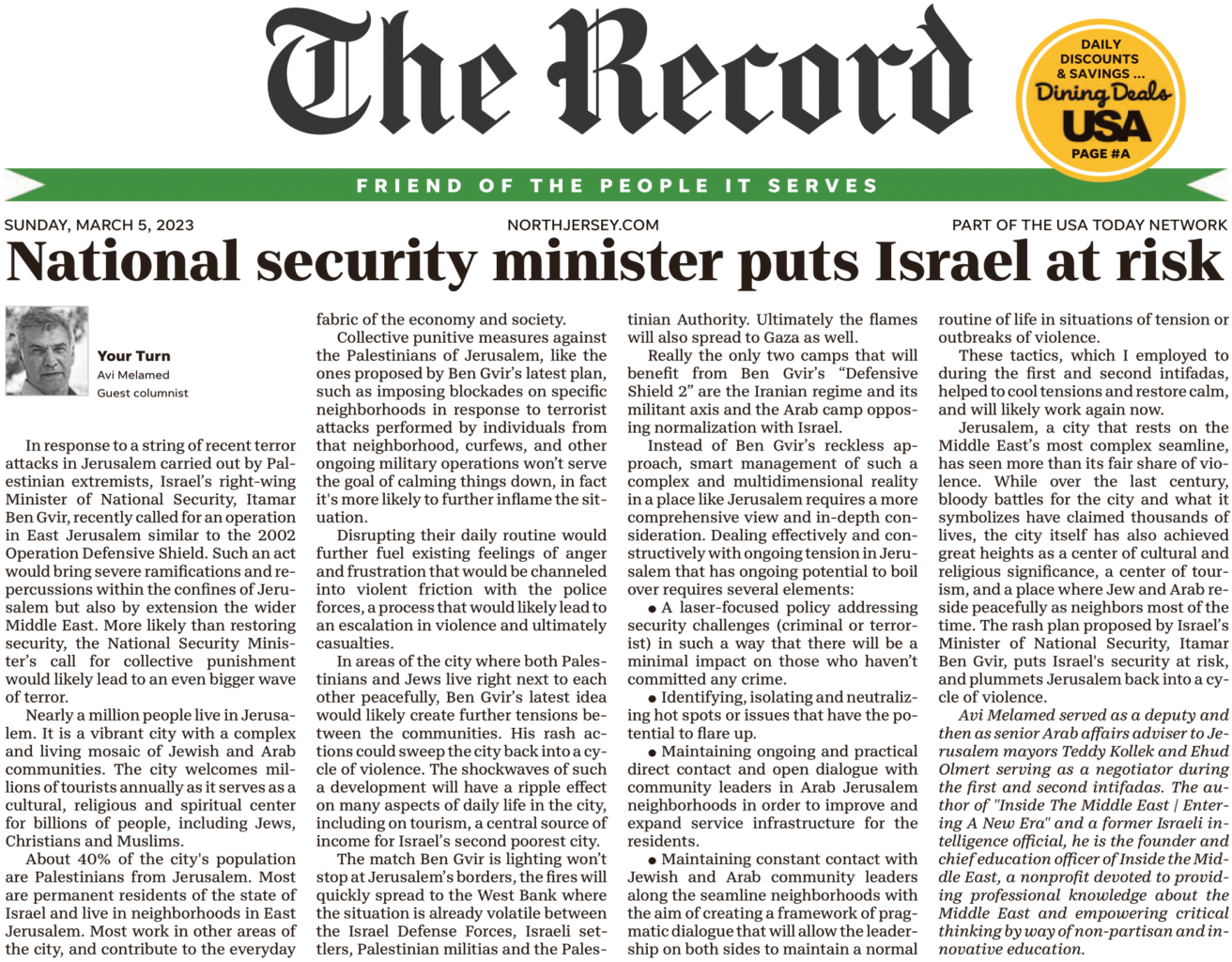|
Getting your Trinity Audio player ready...
|
“This is how Israel ’s National Security Minister, Itamar Ben Gvir, puts his country at risk”, Originally published in USA-Today | March, 01 2023, as well as in more than 200 newspapers (online & print) across North America.
Estimated reading time: 5 minutes
In response to a string of recent terror attacks in Jerusalem carried out by Palestinian extremists, Israel’s right-wing Minister of National Security, Itamar Ben Gvir, recently called for an operation in East Jerusalem similar to the 2002 Operation Defensive Shield. Such an act would bring severe ramifications and repercussions within the confines of Jerusalem but also by extension the wider Middle East. More likely than restoring security, the National Security Minister’s call for collective punishment would likely lead to an even bigger wave of terror.
Nearly a million people live in Jerusalem. It is a vibrant city with a complex and living mosaic of Jewish and Arab communities. The city welcomes millions of tourists annually as it serves as a cultural, religious, and spiritual center for billions of people, including Jews, Christians and Muslims.
“This is how Israel ’s National Security Minister, Itamar Ben Gvir, puts his country at risk”, Originally published in USA-Today | March, 01 2023, as well as in more than 200 newspapers (online & print) across North America.
About 40% of the city’s population are Palestinians from Jerusalem. Most are permanent residents of the state of Israel and live in neighborhoods in East Jerusalem. Most work in other areas of the city, and contribute to the everyday fabric of the economy and society.
Collective punitive measures against the Palestinians of Jerusalem, like the ones proposed by Ben Gvir’s latest plan, such as imposing blockades on specific neighborhoods in response to terrorist attacks performed by individuals from that neighborhood, curfews, and other ongoing military operations won’t serve the goal of calming things down, in fact it’s more likely to further inflame the situation.
Disrupting their daily routine would further fuel existing feelings of anger and frustration that would be channeled into violent friction with the police forces, a process that would likely lead to an escalation in violence and ultimately casualties.
In areas of the city where both Palestinians and Jews live right next to each other peacefully, Ben Gvir’s latest idea would likely create further tensions between the communities. His rash actions could sweep the city back into a cycle of violence. The shockwaves of such a development will have a ripple effect on many aspects of daily life in the city, including on tourism, a central source of income for Israel’s second poorest city.
The match Ben Gvir is lighting won’t stop at Jerusalem’s borders, the fires will quickly spread to the West Bank where the situation is already volatile between the Israel Defense Forces, Israeli settlers, Palestinian militias and the Palestinian Authority. Ultimately the flames will also spread to Gaza as well.
Really the only two camps that will benefit from Ben Gvir’s “Defensive Shield 2” are the Iranian regime and its militant axis and the Arab camp opposing normalization with Israel.
Instead of Ben Gvir’s reckless approach, smart management of such a complex and multidimensional reality in a place like Jerusalem requires a more comprehensive view and in-depth consideration. Dealing effectively and constructively with ongoing tension in Jerusalem that has ongoing potential to boil over requires several elements:
- A laser-focused policy addressing security challenges (criminal or terrorist) in such a way that there will be a minimal impact on those who haven’t committed any crime.
- Identifying, isolating, and neutralizing hot spots or issues that have the potential to flare up.
- Maintaining ongoing and practical direct contact and open dialogue with community leaders in Arab Jerusalem neighborhoods in order to improve and expand service infrastructure for the residents.
- Maintaining constant contact with Jewish and Arab community leaders along the seamline neighborhoods with the aim of creating a framework of pragmatic dialogue that will allow the leadership on both sides to maintain a normal routine of life in situations of tension or outbreaks of violence.
These tactics, which I employed to during the first and second intifadas, helped to cool tensions and restore calm, and will likely work again if employed now.
Jerusalem, a city that rests on the Middle East’s most complex seamline, has seen more than its fair share of violence. While over the last century, bloody battles for the city and what it symbolizes have claimed thousands of lives, the city itself has also achieved great heights as a center of cultural and religious significance, a center of tourism, and a place where Jew and Arab reside peacefully as neighbors most of the time. The rash plan proposed by Israel’s Minister of National Security, Itamar Ben Gvir, puts Israel’s security at risk, and plummet Jerusalem back into a cycle of violence.

The Bergen Record has the second largest circulation of New Jersey’s daily newspapers. It has 2,391,428 readers (print + online).
“This is how Israel ’s National Security Minister, Itamar Ben Gvir, puts his country at risk”, Originally published in USA-Today | March, 01 2023, as well as in more than 200 newspapers (online & print) across North America.
If you want to have a better understanding of the news and what really drives the unfolding events…
Read the latest book of Avi Melamed,
INSIDE THE MIDDLE EAST | ENTERING A NEW ERA, available now >>>
Follow me on Twitter @AviMelamed; Facebook @InsideTheMiddleEast; for more Videos on YouTube https://www.youtube.com/c/AviMelamed
I can always be reached at Av*@********ed.com
































































